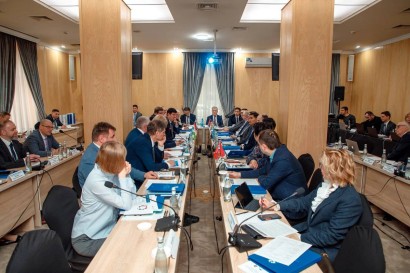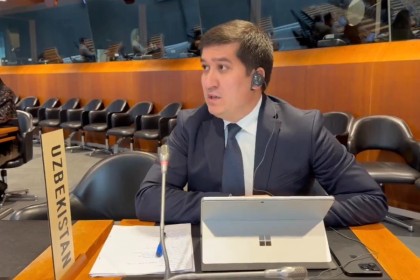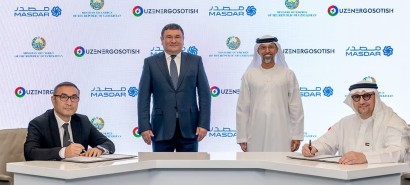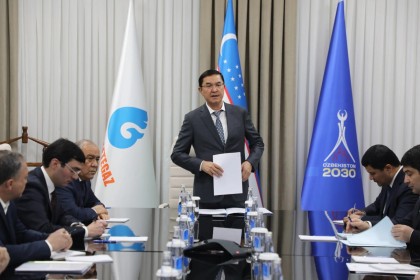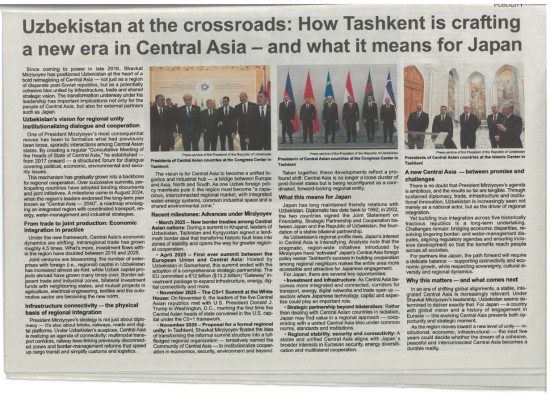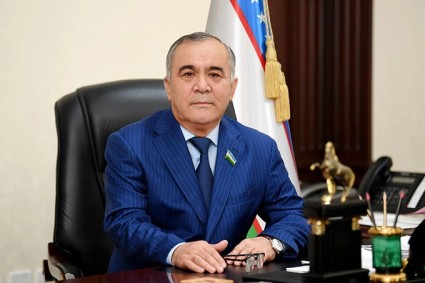Since 1993, UNDP has supported Uzbekistan’s continued development, and a significant amount of that work has taken place in the Fergana valley. From the 16th to the 17th of January 2018, UN Resident Coordinator and UNDP Resident Representative Helena Fraser visited Andijan, Namangan and Fergana regions and familiarized with sites that demonstrated the variance of UNDP’s development work in the region to review the successes that have made in the regions to date.
Digital Law
The Fergana inter-district court is a success in its ICT implementation, but is impressively not unique in its success. Its 74 fellow inter-district courts have also equally benefited from the national electronic case management system (E-SUD), and 2017 saw the ‘Rule of Law Partnership in Uzbekistan’ implemented by UNDP, the United States Agency for International Development (USAID) and Supreme Court of Uzbekistan ensure that all civil courts of Uzbekistan could equally benefit from the enhanced tool.
In October 2017, 15 inter-district civil courts of the Fergana Valley were equipped with modern computer equipment, valued at 60,000 USD, that helped to connect the courts to the E-SUD. About 130 specialists were trained to use the system. And from October 2017, the E-SUD effectively works in each of the Fergana valley’s inter-district civil courts.
“On the administrative side, ICT systems allow us to process requests faster and more efficiently. This combined with tools for better public engagement, we can more easily understand the needs of Uzbekistan’s citizens,” said judge of the Ferghana inter-district civil court Elyorjon Ismoilov.
Since the beginning of October 2017, 5,610 applications have been submitted to our inter-district civil court via E-SUD, indicating a rising interest in the system by public, legal entities, and lawyers. It is noteworthy that in the first three quarters of 2017, 56 applications were dismissed by courts due to errors and after the launching E-SUD in the fourth quarter of 2017, this figure decreased to O (zero).
During the visit, Ms. Fraser reviewed the court’s infrastructure used to ensure the successful establishment of the E-SUD system, including the PCs and digital equipment provided by the rule of law project, and the related training offered. She also spoke to lawyer Zilola Okhunova, who was one of the 60 specialists trained to use the E-SUD programme in Ferghana city.
“Savings from the implementation of the E-SUD are substantial and result from a reduction in the use of paper, the time spent in court, the need for storage space, as well as a general streamlining of processes and service. It contributes to wider access and transparency, better regulation of electronic evidence, and fostering of legal knowledge. Thanks to the E-SUD, I managed to reduce my lawyer’s services cost for citizens by 10 percent”.
Biogas energy
Uzbekistan has substantial renewable energy potential, which is still largely untapped. According to the preliminary estimates, total potential of biogas in Uzbekistan is estimated to exceed 8.9 billion cubic meters annually. As the calorific value, this corresponds to 6.5 billion cubic meters of natural gas, accounting for more than 10% of annual demand for energy in Uzbekistan.
The establishment of Biogas energy, as an alternative to often-insufficient natural gas supplies, has been a predominantly-positive outcome of the work of UNDP with financial support from the Ministry for Foreign Affairs of Finland and Ministry of Foreign trade of Uzbekistan towards establishing better energy independence, environmental protection, and a better standard of life for the majority of Uzbekistan’s citizens.
In her visit to the ‘Davron Agrosanoat’ company in Andijan, where in 2016, UNDP helped to install 400 m3 volume biogas plant- the largest in the region she spoke with one of the founders Ulugbek Nosirov while touring the facilities’ gas storage tanks and infrastructure that had been installed and maintained under the business’ ownership, in partnership with UNDP.
“The convenience and advantage of biogas lies in the use of locally-available raw materials to obtain bio fertilizers from animal and farm waste. In additional to the traditional use of that detritus to fertilize fields, we can also now apply it to generate power,” Nosirov said.
During the 2016-2017 winter season, the biogas facility’s use expanded almost twofold, generating 10 jobs, while the fertilizers obtained helped improve fruit and vegetable yields by 4% during the 2017 season.
UNDP, through joint projects, has consistently supported the government of Uzbekistan in defining strategies and approaches to expand the use of alternative energy sources. In particular, UNDP assisted in the development of a national standard for biogas plants, which was adopted in 2013.
Enhancing employment opportunities in the regions of Uzbekistan
Each year about half a million of young people enter the workforce of Uzbekistan, putting high pressure on the job market and the need to create employment opportunities. Labor force participation rates are particularly low among women. According to the State Statistics Committee for 2013, the percentage of economically active population among men was 74.5%, and among women it was 66.3%.[1] Thus, UNDP works to support the promotion of inclusive business models in the regions of the country to promote job creation, especially focusing women and girls - college graduates.
i) Supporting private sector to advance women’s economic empowerment in Namangan
In 2015, Imron Textile Group was a small factory employing three women. However, with financial and technical assistance from UNDP, the company has expanded its production and provided 70 women with decent work.
“UNDP helped us to purchase modernized and energy-efficient sewing and design equipment,” explains Islombek Qutfitdinov, Director of Imron Textile Group. “We also hired dozens of new employees, trained them on sewing production techniques, business planning, marketing and product promotion.”
Since 2015, Imron Textile Group’s production increased 73 percent and exports have grown from US$38,000 to more than $ 500,000 in 2017. The Imron Textile Group has plans to further expand the size of its building, its mechanical infrastructure and its range of products – thus raising the total number of jobs to 300 and increasing the export volume three-fold.
ii) From manual model-making methods to Computer Aided Design
In 2016, UNDP in partnership with the Chamber of Trade and Industry of Uzbekistan established the Garment Design Centre in Namangan to provide on-the-job experience for young graduates, particularly for women, and improve their employment opportunities and living standards. Since then, 48 graduates of vocational colleges, of which 22 girls practiced and mastered garment design and modeling skills in the centre, 8 graduates were employed in the ‘Istiqlol Dizayn Markazi’ and associated factories.
UNDP helped to equip this centre with latest ‘CAD’ (computer-aided design) software, a 3D modelling tool, marker making and cost calculation modules along with computers and server that allows designers to easily experiment in a digital realm, and create very accurate patterns for clothes. By eliminating tedium and ‘busy work’, CAD has been a catalyst for creativity and productivity, as well as efficiency.
As an investment of financial and technological resources, the centre helps establish a strong textile brand for the Namangan region, improve textile product quality, reach export markets, and boost young people and women’s employment.
Ensuring access to water and improving water management
Today, the system of effective management, delivery, distribution and use of water resources in Uzbekistan requires modernization. More than 90% of water is used in agriculture with some losses in distribution networks due to outdated infrastructure and inefficient measuring facilities, insufficient provision of Water Users Associations (WUAs) with transport and mobile water measuring devices; the need of water management specialists in the WUA in new knowledge and skills to provide better water delivery services.
In 2017, with the purpose of increasing the access to water of farmers and 24 875 people of rural communities with the assistance of UNDP and financial support of the European Union the material and technical base of the Water Users Association “Zarmirob-Turgunboy” in Tashlak district of Fergana region was strengthened through the renovation of its premises and provision of transport means, water measuring devices aimed to improve working conditions, water accounting and control in the association.
The canal “Zarkent” in Tashlak district that serves 2,800 ha was also renovated and the construction of 3 cross structures at the canal as well as additional canal to improve water supply to horticultural farms was planned. This will help to improve water availability of 17 farmers and 3605 households.
UNDP is also working on the construction of drinking water supply system for rural population in the territory “Gulistan” makhalla in Kuva district that will ensure safe drinking water to 5014 local people, including school and kindergarten.








